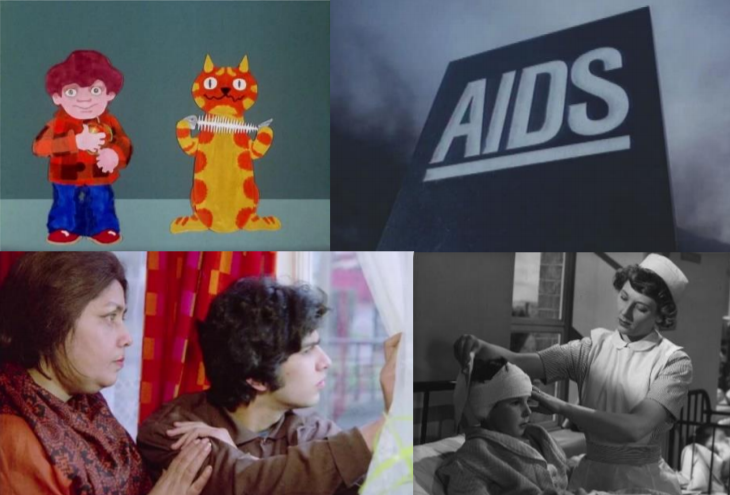NATIONAL COLLECTIONS COME TOGETHER TO OPEN UP THEIR ARCHIVES TO CELEBRATE THE 75TH ANNIVERSARY OF THE CENTRAL OFFICE OF INFORMATION (COI)
EVCOM are very much looking forward to partnering with the BFI and working with Patrick Russell, to deliver a Talking Pictures session this October which will be themed around the COI. If you have worked for the COI, we’d love to hear from you. We hope this Talking Pictures session will be a chance for COI employees to come together and celebrate so much brilliant and impactful work! If you have worked with the COI, then please get in touch with amelia.brown@evcom.org.uk.
To mark the 75th anniversary of the Central Office of Information (COI), the BFI, The National Archives and Imperial War Museums (IWM) are coming together to showcase the broad and eclectic range of work produced by the department. From the Charley Says (1973) public information film series and classic safety films like Lonely Water (1973) and Apaches (1977), to the controversial AIDS awareness campaign, the COI produced some iconic screen moments during its fascinating history. The BFI, The National Archives and IWM have worked together for decades to help preserve the work of the COI, with each archive now selecting material to help tell its story through a series of collaborative events taking place over the rest of the year to celebrate #COI75.
Founded in 1946 as a successor to the wartime Ministry of Information, the COI communicated government messages to the public, devising and delivering a wealth of public service information (and propaganda) including films, photographs, leaflets, posters, newspaper and magazine advertisements and radio broadcasts.
These were national communication campaigns designed to inform the public, at home and abroad on a wide variety of issues, such as health, safety, welfare, education, rights and military recruitment. Though some of the information campaigns for domestic audiences remain well-known, the COI’s biggest client was in fact the Foreign and Commonwealth Office, often for films not even shown in the UK, which painted a picture of British life for audiences abroad. The COI produced and distributed thousands of films which literally changed, and even saved lives, before finally closing its doors in 2012.
Anniversary celebrations launched with a BFI At Home event on 23 June , a whistlestop introductory tour of the work of the COI and the diversity of its output and its impact, with illustrated film clips and insights from curators Patrick Russell (Senior Curator, BFI National Archive), Sarah Castagnetti (Visual Collections Manager, The National Archives) and Michelle Kirby (Film Curator, IWM). Catch it up below:
To coincide with the BFI At Home event, the BFI, The National Archives and IWM began a roll out of a series of joint curated blogs which will continue across the rest of the year on each of their websites, exploring specific themes and COI campaigns in more depth, incorporating materials from each collection. You can read the opening blog here!
As part of this celebration, the BFI have gathered together a rich and varied selection of 75 COI films in one place on the BFI Player. Check it out here for a selection of some of the best known titles and impactful campaigns.
During this anniversary year, the partnership will go on to explore the COI’s techniques which embraced all the main forms of film: documentary, animation and newsreel, drama, comedy and even horror. The sheer scale of the COI’s film output made it central to Britain’s post-war film industry, with work from some of Britain’s leading filmmakers including Ken Loach (Talk About Work, 1971), Peter Greenaway (The Sea in Their Blood, 1983), Nic Roeg (AIDS Monolith, 1987), John Mackenzie (Apaches, 1977), Lindsay Anderson (Foot and Mouth, 1955) and Hugh Hudson (Design For Today, 1965). Big acting names were also brought in, with Donald Pleasence narrating Lonely Water (1973), and John Hurt, voicing the AIDS Monolith (1987) advert, for example.
Beyond the big names were the expert creatives and technicians, like the talented Sarah Erulkar (Never Go With Strangers, 1971, The Smoking Machine), the first person of South Asian heritage to work as a director in any sector of the British screen industries, and John Krish (Return to Life, 1960), a towering talent of sponsored documentary who worked both for the COI and British Transport Films. The COI also made names; Richard Massingham, a familiar face to 1940s cinemagoers, played a bumbling everyman in a series of films, becoming the first star of the public information film, with whimsical titles such as Jet-propelled Germs (1948), Handkerchief Drill (1949) and Another Case of Poisoning (1949).
The partnership between BFI, The National Archives and IWM is an incredible opportunity for reinterpretation, new insights and a chance for rediscovery, exploring the COI’s significance and legacy through materials held across the three archives.
Patrick Russell, Senior Curator of Non-fiction, BFI National Archive said, “When Britain’s creative industries interact with the varied needs and demands of government, the results are fascinating. The story of the COI tells us so much about film, the British film industry and British society. By bringing materials and curatorial expertise from our three national collections together, we can tell a rounded story – not just the public information campaigns like Charley Says and AIDS awareness, which left an indelible mark on our collective consciousness, but also so much more. The COI’s story is richer than you might think, more varied, complex and endlessly debatable.”


